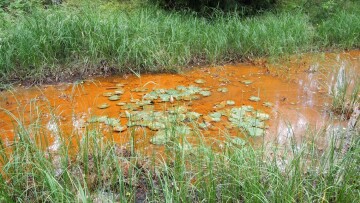Biodegraded peat and ultrafine calcium carbonate result in retained metals...

The article "Biodegraded peat and ultrafine calcium carbonate result in retained metals and higher microbial diversities in boreal acid sulfate soil" was published in Soil Ecology Letters (2020), Springer Link and can be found on this site >> https://doi.org/10.1007/s42832-020-0039-1
Abstarct
To efficiently mitigate bacterial mediated acid and metal discharge from acid sulfate soils, iron-and sulfur-oxidizing microorganisms that catalyze the iron sulfide dissolution should be inactivated. An organic carbon source could further be introduced into the soil to promote the growth of iron- and sulfur-reducing bacteria. In this study, acid sulfate soil was amended with a mobile form of ultrafine calcium carbonate alone or in combination with fractions of peat, sodium acetate, or sodium lactate. The introduction of ultrafine calcium carbonate resulted in a raised pH that appeared to inactivate the acidophiles, but did not reactivate iron- or sulfur-reducing bacteria. The addition of organic matter resulted in higher microbial diversities and retention of metals, although acid-tolerant and acidophilic microbes still dominated. A low abundance of an iron-reducing bacteria was identified in the all treatments with both peat fractions and pure organic carbon compounds. These results indicated that biodegraded peat could be used as an energy source for at least iron-reducing bacteria in the acid sulfate soil at the same time as it retains metals in the soil. These findings are of value for further developing mitigation methods for the sustainable use of acid sulfate soils.